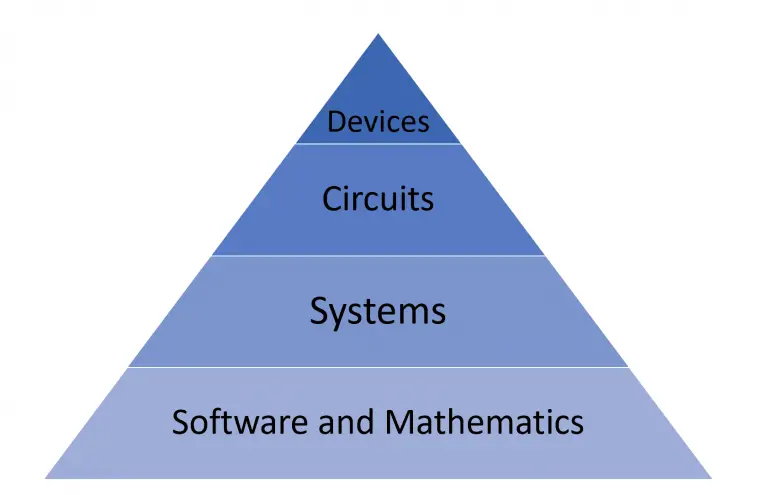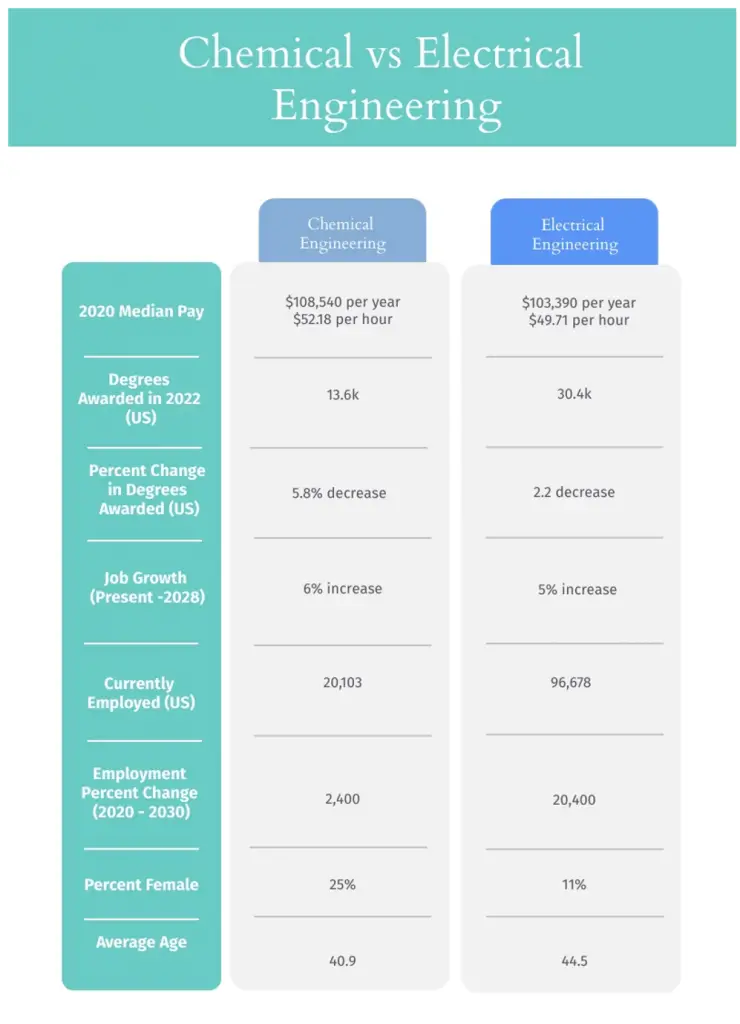

Are you in highschool or university and not sure about what degree to specialize in? Are chemical and electrical engineering both options that you are considering?
Well this is the article for you.
After reading this article, I hope that you walk away with a better understanding of the similarities and differences between the chemical and electrical engineering programs, the job prospects for each program, and which degree is a better fit for you.
Let’s get started
Electrical engineering is essentially about utilizing electrical systems to create, process and transmit energy and information.
It encompasses 4 main levels of abstraction.

Careers for electrical engineers show up across a wide range of industries from general manufacturing jobs in the automotive or aerospace sectors, to military jobs in high tech satellites, missiles, and cameras. The other major industries that electrical engineers work in are power, digital and analog electronics, signal processing, control systems and artificial intelligence.
Johanan Agarwal is an electrical engineering graduate from UBC currently working at Intel. He describes the discipline in the following quote:

Platform Architect Engineer at Intel
UBC Electrical Engineering Graduate
Electrical engineering is an incredible broad and diverse field which applies the priniples of electromagnetism to a range of applications such as digital circuits, control systems and power electronics to name a few.
Although a degree in EE is challenging the job opportunites that follow are vast due to the breadth of knowledge that's covered in the program. There's also lots of room to specialize in upper year courses relevant to your field of interest.
Some popular careers with an EE degree include embedded systems, robotics, digital circuit design, power systems design, and RF design. It's also not uncommon for EEs to get into software.
Chemical Engineering is the application of scientific principles to create, optimize and control a process that transforms raw materials into a product of value.
The chemical engineering curriculum contains courses in thermodynamics, heat and mass transfer, kinetics, and reactor design to name a few. Just like electrical engineering, the job opportunities spread across a wide range of industries, and the type of work can vary considerably as well.
Many chemical engineers work with designing and scaling industrial plants, sizing equipment, performing safety analysis, optimizing systems, and developing risk mitigation strategies.
Remember, chemical engineering is not chemistry. It is important to understand this distinction, and you can get a much better understanding from the article “Can a chemist become a chemical engineer”.
One of my colleagues is a chemical engineer at StemCell Technologies, and describes chemical engineering in the following way.

GMP Manufacturing Technologist at STEMCELL Technologies
I would say it's bridging the gap between the lab and the industrial scale. Scaling up processes and optimising them
*These figures are from the US Bureau of Labor Statistics and DataUSA.

With lots of subjective answers on which discipline is “harder”, the simple answer is that both chemical engineering and electrical engineering are challenging disciplines, each with their fair share of rough courses.
However, the discipline that you will find easier will be the discipline that you enjoy more.
Here are the major courses that electrical engineers take in a 4 year accredited university program.
Chemical Engineering Fields
Electrical Engineering Fields
Chemical Engineering
Since chemical engineering is essentially the engineering of industrial processes, jobs are tied to the physical location of large-scale production facilities. Because most people don’t want to live near a scary looking 200MW nuclear facility, these industrial facilities are typically located away from major cities. As a result, many chemical engineers spend time working in small rural towns or remote areas. These are typical for oil and gas, mining, or manufacturing jobs.
Electrical Engineering
Most electrical engineers do work in offices since large technology companies are densely populated near city centers in areas such as silicon valley in Northern California. However there are still many opportunities for electrical engineers to work with hardware in labs, or control systems at large power plants. Due to the software side of electrical engineering, and the push towards remote work due to COVID, electrical engineers find themselves with a much larger opportunity to work remotely from wherever they want when compared to chemical engineers.
Passion is key
Choose the field that you are interested in the most to set yourself up for success. Don’t worry about the pay, there are always ways to make money.
Understand your long term goals
Understanding where you envision yourself 5, 10 and 20 years down the road will help you choose the right discipline.
Listen to yourself first
Everyone will have their own subjective views on what they believe is better or worse. Before you factor in the conflicting opinions of others, listen and process your own unique thoughts first.
Find a mentor
This is one of the most underutilized methods of helping you figure out what is right for you. Introduce yourself to students or go on LinkedIn and message chemical and electrical engineers in different fields to get first hand experience.
Let me end by saying that asking the question of “which engineering discipline is best” is like asking “what dog is best”. Different strokes for different folks.
It is important to understand that both chemical and electrical engineering are important disciplines, contribute towards a better society, and offer strong job prospects. Furthermore, these two disciplines are greatly interdependent on each other, and neither discipline can survive without each other. Just imagine a polyethylene plant without a process control system. Or developing a CPU without manufactured silicon.
I hope this article has helped you get a better idea about similarities and differences between chemical engineering and electrical engineering, and a clearer direction for your own path.
I hope I have been able to provide an objective case for both degrees in this article. If you’re in the process of making a decision, we would be interested to hear how you are thinking through that in the comments!